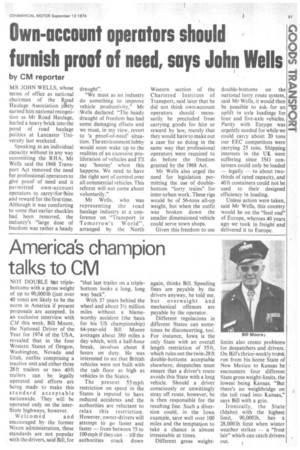Own-account operators should furnish proof of need, says John Wells
Page 53

If you've noticed an error in this article please click here to report it so we can fix it.
by CM reporter
MR JOHN WELLS, whose terms of office as national chairman of the Road Haulage Association jttstly earned him national recognition as Mr Road Haulage, hurled a heavy brick into the pond of road haulage politics at Lancaster University last weekend.
Speaking in an individual capacity without in any way committing the RHA, Mr Wells said the 1968 Transport Act removed the need for professional operators to give proof of need and it permitted own-account operators to carry for hire and reward for the first time. Although it was comforting to some that earlier shackles had been removed, the industry's "large dose of freedom was rather a heady draught".
"We must as an industry do something to improve vehicle productivity," Mr ,Wells declared. "The heady draught of freedom has had some damaging effects and we must, in my view, revert to 'a proof-of-need' situation. The environment lobby would soon wake up to the realities of an excessive proliferation of vehicles and I'll say 'hooray' when this happens. We need to have .the right sort of control over all commercial vehicles. This reform will not come about voluntarily."
Mr Wells, who was representing the road haulage industry at a conference on "Transport in Tomorrow's World", arranged by the North Western section of the Chartered Institute of Transport, said later that he did not think own-account operators should necessarily be precluded from carrying goods for hire or reward by law, merely that they would have to make out a case for so doing in the same way that professional operators were required to do before the freedom granted by the 1968 Act.
Mr Wells also urged the need for legislation permitting the use of doublebottom "lorry trains" for inter-urban work. These rigs would be of 56-tons all-up weight, but when the outfit was broken down the smaller dimensioned vehicle could serve town shops.
Given this freedom to use double-bottoms on the national lorry route system, said Mr Wells, it would then be possible to ask. for an uplift in axle loadings for four and five-axle vehicles. Parity with Eurppe was urgently needed for while we could carTy about 20 tons our EEC competitors were carrying 25 tons. Shipping interests in the UK were suffering since ISO containers could only be loaded — legally to about twothirds of rated capacity, and 40 ft containers could not be used to their designed efficiency in loading.
Unless action were taken, said Mr Wells, this country would be on the "feed end" of Europe, whereas 40 years ago we took in freight and delivered it to Europe.




























































































































































































































